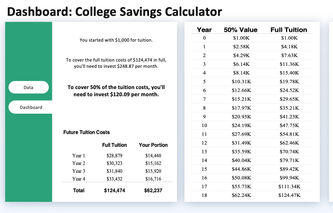College Guides
Student Loans
Moneyzine Editor
December 6th, 2023
Here’s a whopping list of 250+ sales statistics across 25 different categories. We’ve scoured numerous rabbit holes on the internet, scanned reports, and examined credible studies, to compile the most comprehensive list of sales statistics. We raked through the most trusted sources, like The Harvard Business Review, The Pew Research Center, HubSpot, and more, so you don’t have to.

Deepti Nickam
December 1st, 2023

We all want to make more money. But that doesn’t mean college is for everyone. Between rising student loan costs and the need for more trade skills, you don’t have to study for 4+ years to get a well-paying job. In this article, we’re highlighting 20+ jobs that pay 50k a year without a degree.

Kimberly Studdard
November 30th, 2023

Looking for jobs that pay 70k a year without a degree? It's a good search to make because it's definitely not a pipe dream. Some people go to college, pay tens of thousands of dollars, and get a job that maxes out at $40,000 a year. It just makes absolutely no sense! Why not instead get into a career field that can earn $70k a year or more?

Derek Sall
April 18th, 2024

If you’re after a career in the power industry, your job hunt won’t be a waste of energy. You can get ex-static about the opportunities because you’ll be shocked by what’s out there for people with your potential.

Lauren Bedford
April 18th, 2024

Most of us wouldn’t mind making a few extra bucks (or a lot more) every month. It used to be you had to work your full-time job, and that was it. But now, new types of side hustles pop up all the time!

Derek Sall
March 20th, 2024
Your fresh job offer letter says you’ll make $60,000 a year—and you can’t help but wonder how much you’ll earn an hour, a day, and a week. What will your lifestyle look like? And how much of this will go toward the dreaded taxes?

Deepti Nickam
April 18th, 2024
Are lawyers rich? People will automatically bring up lawyers when describing “successful, wealthy people.” But if you look at Forbes wealthiest people list, there are relatively few, if any, lawyers among them. Instead, investors, business leaders, property owners, and oligarchs fill the ranks. Why is this?

Kimberly Studdard
April 18th, 2024
It’s been a rocky time for the average employee. After a global pandemic, more people than ever have quit their job or abandoned the office to work from home. The big question is, has all the uncertainty affected how much work people do?

Derek Sall
March 20th, 2024
Work-life balance has always been a hot topic for discussion, but it was pushed further into the spotlight after Covid-19 forced many workers and students into lockdown. As boundaries between work and home life became blurred, many struggled to maintain a healthy balance.

Lauren Bedford
April 2nd, 2024

The workforce is important—so much so that the United States citizens seem to drop everything when the weekly jobless claims are reported each Thursday.

Derek Sall
November 30th, 2023
Is DoorDash a good side hustle? Yes, it is. How much can you make with DoorDash? Reports say $15–$25 an hour. But that’s before taxes, gas, and other fees. We’ll give you all the numbers to help you decide.

Derek Sall
March 20th, 2024
What if we told you there’s a magical band-aid that can prevent you from bleeding out of cash during a recession, job loss, and most other worst-case scenarios? That band-aid is a financial cushion—liquid investments and saved-up cash for a rainy day.

Deepti Nickam
March 20th, 2024

It should come as no surprise that happier workers perform better. However, if you need numbers and studies to show your boss — we compiled a list of job satisfaction statistics from the most reputable sources out there. If you need more ammo, you’ll also find numbers on job dissatisfaction, worker happiness and productivity, satisfaction rates by industry, and satisfaction rates by country. Read on — you’ve got this!

Dunja Radonic
December 5th, 2023

Since the start of the pandemic in 2020, the popularity of remote work has been off the charts. Companies had no choice but to take advantage of working remotely because employees could not physically come into the office. However, as our selection of remote work statistics will show, remote work continues to be a large part of the new work environment even when the pandemic isn’t in full swing.

Martynas Pupkevicius
March 26th, 2025
Let's face it; earning enough money to pay your monthly bills and fund a retirement account is the start of the financial planning process. We've recognized the importance of developing a career to maximize you earning potential. Our career development section contains information that should help you find a good job and be successful.
Moneyzine Editor
December 6th, 2023























